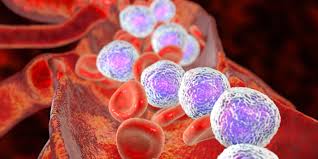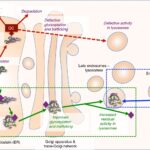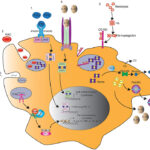Lymphoid blast phase Philadelphia chromosome-positive chronic myelocytic leukemia (CML) represents an advanced stage of CML characterized by the accumulation of immature lymphoid blast cells in the bone marrow and blood. This transition from chronic phase to blast phase significantly worsens prognosis and requires immediate therapeutic intervention.

Pathophysiology of Lymphoid Blast Phase CML
CML is driven by the presence of the Philadelphia chromosome (Ph), a genetic abnormality resulting from a translocation between chromosomes 9 and 22. This translocation creates the BCR-ABL1 fusion gene, which encodes a constitutively active tyrosine kinase that drives uncontrolled cell proliferation.
Mechanism of Disease Progression
- Chronic Phase: Initially indolent with elevated white blood cell counts and mild symptoms.
- Accelerated Phase: Increased blast cells (10–19% in blood or bone marrow) with rising resistance to therapy.
- Blast Phase: Defined by >20% blasts in blood or bone marrow, mimicking acute leukemia.
Clinical Presentation
Symptoms
- Persistent fatigue
- Unexplained weight loss
- Easy bruising and bleeding
- Fever and night sweats
- Bone pain and joint discomfort
- Enlarged spleen (splenomegaly) leading to abdominal discomfort
Diagnostic Criteria
- Peripheral blood smear: Increased blast cells
- Bone marrow biopsy: Presence of >20% blasts
- Cytogenetic analysis: Confirmation of the Philadelphia chromosome
- Molecular testing: Detection of BCR-ABL1 mutations
Treatment Strategies
Tyrosine Kinase Inhibitors (TKIs)
TKIs like imatinib, dasatinib, nilotinib, bosutinib, and ponatinib are the first-line treatment for Ph+ CML. However, in blast phase, resistance to TKIs is common, necessitating alternative approaches.
Chemotherapy
Combination chemotherapy regimens similar to those used in acute lymphoblastic leukemia (ALL) are often employed, including:
- Vincristine
- Prednisone
- Cyclophosphamide
- Doxorubicin
Hematopoietic Stem Cell Transplant (HSCT)
Allogeneic bone marrow transplantation remains the only curative option for patients who achieve remission following induction therapy.
Emerging Targeted Therapies
Novel targeted agents such as BCL-2 inhibitors, JAK inhibitors, and monoclonal antibodies are being investigated for treatment-resistant cases.
Prognosis and Survival Rates
The prognosis for lymphoid blast phase Ph+ CML remains poor, with median survival ranging from 3 to 12 months without successful treatment. Early detection and aggressive intervention improve outcomes significantly.
Lymphoid blast phase Philadelphia chromosome-positive CML is a critical stage in the progression of CML that requires immediate medical attention. Advances in targeted therapy and transplantation offer hope, but ongoing research remains essential for improving long-term survival.

